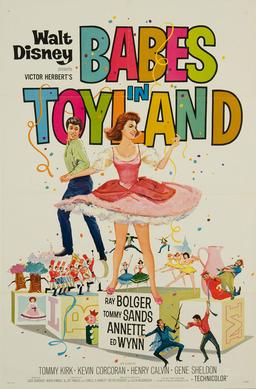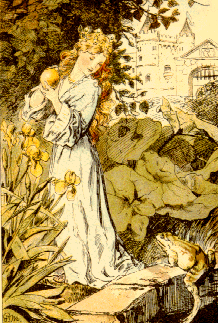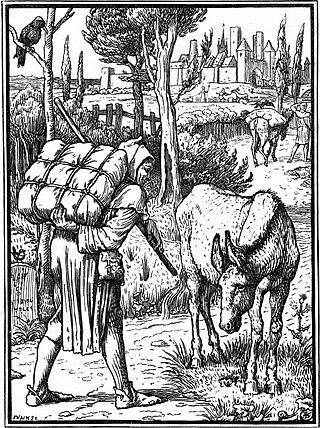Evelyn Sharp's short story "The Wonderful Toymaker" is part of a collection of fairy tales in the book, All the Way to Fairyland: Fairy Stories. The Cambridge University Press originally published the anthology in 1897. An EBook version was made available through The Project Gutenberg on 3 November 2009. [1]
The tale of "The Wonderful Toymaker" begins with a spoiled princess named Petulant, an eight-year-old girl who cannot be pleased at any cost. Her father, the King, gathers his council together to help find a toy for the Princess that will surpass all others. The Prime Minister volunteers his son Martin to find the princess a special toy. Martin talks with Princess Petulant and promises to return in four weeks with an amazing toy.
At the beginning of Martin's journey he encounters Bobolink, the Purple Enchanter who knows everything. Martin hopes that Bobolink will help him to find his way to The Wonderful Toymaker. However, Bobolink is annoyed about having to provide information about everything to everyone, and is initially reluctant to assist Martin. Martin's lack of flattery towards him serves as a refreshing change, and Bobolink soon becomes quite eager to help him. Bobolink tells Martin that his next step is to reach the pine dwarfs, warning him to avoid conversation with the creatures or he will be stuck in the country of conversation forever. Martin almost makes it through the country of conversation without a single word, but he becomes distracted and engages in conversation with a fish. Martin's error forces him to "become conversation," and suddenly he is trapped with no way out. The princess continues to wait patiently but she eventually becomes very upset that Martin has not returned with her toy. The council becomes worried, and contemplates where Martin could possibly be. The Princess, alone and sobbing, is confronted by a pine dwarf who promises to bring her to the waterfall and show her the way to Martin. The Princess stuffs her ears with cotton and begins her journey.
Princess Petulant finally makes it to Martin without speaking a single word, and they are both able to escape. The two run as fast as they can to the toyshop. The Toymaker, so pleased to see them, wishes that they stay and play with him forever. Martin and Princess Petulant play with the best toys they have ever seen, finally satisfying the Princess’ desire for a new toy. Martin and Princess Petulant tell the Toymaker that they are unable to stay and although he is sad, he assists them in their journey home. Upon their return they tell the entire story to a Royal Historian who records it all in the very book in which this story is contained. [2]
Sharp (4 August 1869 – 17 June 1955) was a British suffragette and Children's writer born in Denmark Hill, London. She was prevented from receiving a formal education by her family for quite some time, but later entered school and attended Collège de France. Sharp began writing novels and short stories that reflected her understanding of children's perspectives, as well as her evolving perspectives on life, social issues, and women's rights. In 1906, after becoming inspired by a speech by suffragette Elizabeth Robins, she became active and devoted to the women's suffrage movement. Sharp married Henry Nevinson in 1933. He died in 1941. Sharp fell into a depression and eventually became blind; she died in London in 1955. [3]
From 1903 she was a journalist, writing primarily for The Daily Herald , The Manchester Guardian , Pall Mall Gazette , and The Morning Leader . [4] Sharp's "first short stories appeared in The Yellow Book, and her first novel, At The Relton Arms (1895)." [5]
Mrs Percy Dearmer produced all of the illustrations for Sharp's anthology of short stories “All the Way to Fairyland: Fairy Stories.” [6]

The Tin Woodman of Oz: A Faithful Story of the Astonishing Adventure Undertaken by the Tin Woodman, Assisted by Woot the Wanderer, the Scarecrow of Oz, and Polychrome, the Rainbow's Daughter is the twelfth Land of Oz book written by L. Frank Baum and was originally published on May 13, 1918. The Tin Woodman is reunited with his Munchkin sweetheart Nimmie Amee from the days when he was flesh and blood. This was a back-story from Baum's 1900 novel, The Wonderful Wizard of Oz.

Babes in Toyland is a 1961 American Christmas musical film directed by Jack Donohue and produced by Walt Disney Productions. It stars Ray Bolger as Barnaby, Tommy Sands as Tom Piper, Annette Funicello as Mary Contrary, and Ed Wynn as the Toymaker.

"The Frog Prince; or, Iron Henry" is a German fairy tale collected by the Brothers Grimm and published in 1812 in Grimm's Fairy Tales. Traditionally, it is the first story in their folktale collection. The tale is classified as Aarne-Thompson type 440.

The Yellow Dwarf is a French literary fairy tale by Madame d'Aulnoy. Andrew Lang included it in The Blue Fairy Book.

The Wicked World is a blank verse play by W. S. Gilbert in three acts. It opened at the Haymarket Theatre on 4 January 1873 and ran for a successful 145 performances, closing on 21 June 1873. The play is an allegory loosely based on a short illustrated story of the same title by Gilbert, written in 1871 and published in Tom Hood's Comic Annual, about how pure fairies cope with a sudden introduction to them of "mortal love."

Charles Robinson (1870–1937) was a prolific British book illustrator.

Evelyn Jane Sharp was a pacifist and writer who was a key figure in two major British women's suffrage societies, the militant Women's Social and Political Union and the United Suffragists. She helped found the latter and became editor of Votes for Women during the First World War. She was twice imprisoned and became a tax resister. An established author who had published in The Yellow Book, she was especially well known for her children's fiction.

Hime Chen! Otogi Chikku Idol Lilpri, also known as Lilpri, is a Japanese shōjo anime directed by Makoto Moriwaki. It was adapted from the Sega arcade game of the same name. It was also adapted into two manga series by Mai Jinna.

"The Hundredth Princess" is a short fairy tale for children written by Evelyn Sharp. This fairy tale is among a collection of other short stories included in Evelyn Sharp's book titled The Other Side of the Sun (1900), which she wrote, published by John Lane.
"The Three Clever Kings" is a children's fairy tale from the anthology The Necklace of Princess Fiorimonde that was written by Mary De Morgan. The story was illustrated by Walter Crane, first published by MacMillan & CO. in 1886, and later published in a collection called The Necklace of Princess Fiorimonde – The Complete Fairy Stories of Mary De Morgan by Victor Gollancz Limited in 1963. This collection of fairy tales was digitized in July 2006 and the first E-book was released February 25, 2012. The E-book was produced by David Edwards, Josephine Paolucci, the Online Distributed Proofreading Team, and edited by The Project Gutenberg E-book.

"The Lady Daffodilia" is a children's short story written by Evelyn Sharp and published in 1900 by John Lane. Along with other works by Evelyn Sharp, it was published in a book entitled The Other Side Of The Sun.

"Somebody Else's Prince" belongs to a collection of short stories, named The Other Side of the Sun, written by Evelyn Sharp (1869–1955) in 1900. Other stories in this collection include: The Weird Witch of the Willowherb, The Magician's Tea-Party, The Hundredth Princess, The Tears of Princess Prunella, The Palace on the Floor, The Lady Daffodilia, and The Kite That Went to the Moon.
"The Little Princess and the Poet" is one of Evelyn Sharp's many fairytales, written in 1898. This short children's story sends the message that beauty is not always seen on the surface but found within the heart of a person. It is part of Sharp's popular story collection, All the Way to Fairyland.

"The Heart of Princess Joan" is a 19th-century fairy tale published in 1880 as part of the collection The Necklace of Princess Fiorimonde and other Stories. This was the second of three published collections of fairy tales by popular children's author, Mary De Morgan. Illustrations for the stories were provided by Walter Crane.

Published in 1886, "The Pedlar's Pack" is a fairy tale written by Mary De Morgan (1850–1907). The protagonist is a traveller and salesman who meets three animals on his journey to a nearby town; the story concludes with the four travellers bitterly vowing to never trust one another again.

"The Tears of Princess Prunella", is a short story belonging to the collection The Other Side of the Sun, written by Evelyn Sharp. Other stories included in this collection are The Weird Witch of the Willowherb, Somebody Else's Prince, The Lady Daffodilia, The Palace on the Floor and The Kite That Went to the Moon.

"The Professor of Practical Jokes" is a literary fairy tale published in 1898 by British suffragist and author Evelyn Sharp (1829–1955). The story tells of a good yet boring king who is tricked into marrying one of his courtiers daughters, who brings excitement into his dull kingdom. The story is one of many published in Sharp's collection, All The Way To Fairyland: Fairy Stories.

"The Doll That Came Straight From Fairyland" is a short story for children published in 1898 by the suffragist and children's fairytale writer Evelyn Sharp. The first edition was published by John Lane in London, England, in All The Way To Fairyland with seven other short stories.

"The Magician’s Tea-Party" is a fairytale written by British suffragist and author Evelyn Sharp in 1900.

Jessie Mabel Pritchard Dearmer was an English novelist, dramatist and children's book author/illustrator. She was a committed pacifist who died while caring for the war wounded in Serbia.